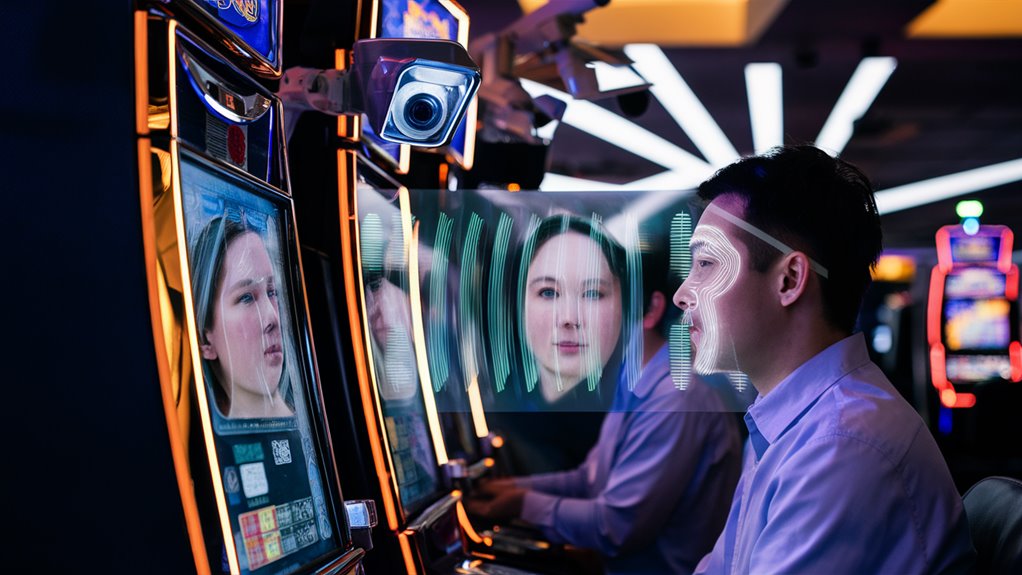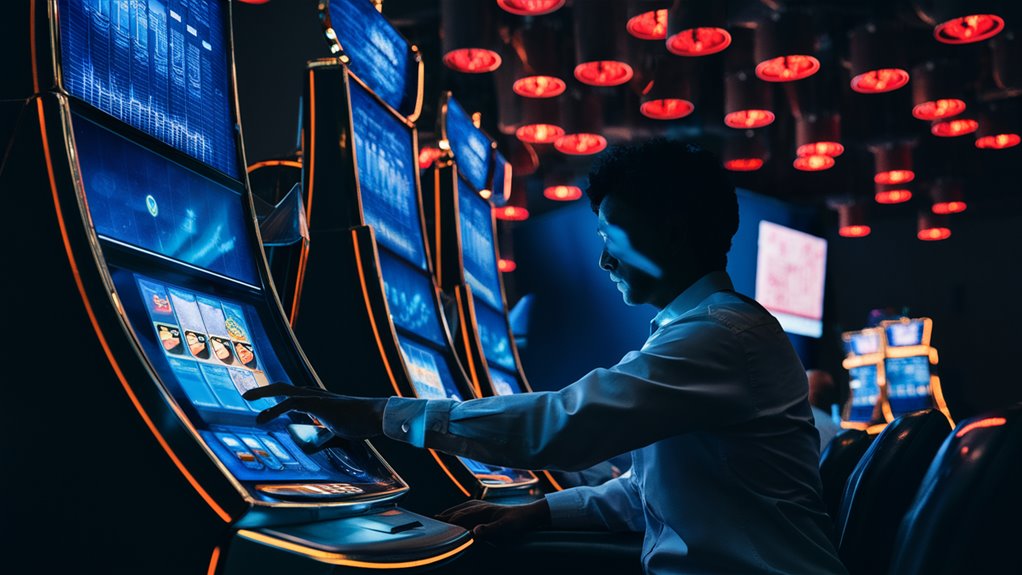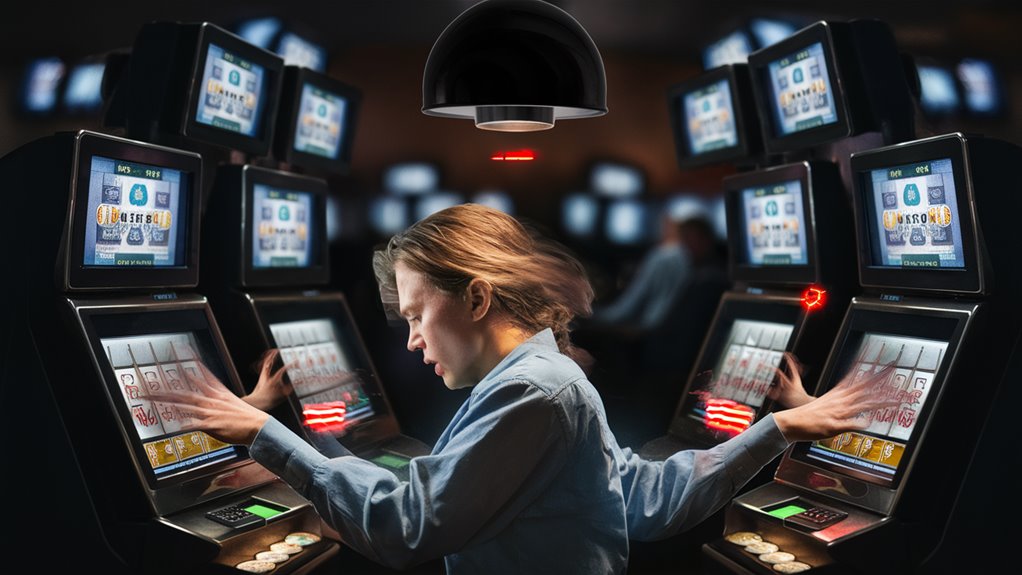Have you ever wondered why online gambling sites seem to know exactly what makes you tick? It’s pretty wild when you think about it. These days, AI systems are working behind the scenes, quietly watching how we play, when we log in, and what games catch our eye. You know those spot-on game suggestions you get? That’s AI doing its thing.
But let’s be real for a moment. While it’s cool that these smart systems can create a more personalized experience, it’s also kind of like having someone looking over your shoulder while you play. Think about it like this: imagine if your local casino had someone following you around, taking notes on every slot machine you tried or every hand of poker you played. Feels a bit different when you put it that way, right?
The tech is impressive, no doubt about it. These systems can predict your gaming preferences better than your best friend could. They know if you’re more likely to play slots on a Friday night or hit the virtual poker tables on Sunday afternoon. Pretty handy when you’re looking for entertainment, but it also brings up some tricky questions.
What happens when this technology gets too good at keeping players engaged? It’s kind of like having a friend who always knows exactly what to say to keep you from leaving the party, even when you probably should head home. The line between helpful personalization and potential manipulation gets pretty blurry.
So while these AI systems are making gambling more engaging and tailored to each player, we need to think carefully about where to draw the line. Sure, it’s great to get recommendations for games we’ll actually enjoy, but we also need to make sure these smart systems aren’t pushing us past our comfort zones when it comes to responsible gambling.
AI Analytics in Modern Casinos

Ever wonder what happens behind the scenes when you step onto a casino floor these days? Well, let’s just say it’s not your grandmother’s slot parlor anymore.
Modern casinos have quietly transformed into high-tech data centers where AI keeps tabs on practically everything you do.
Think about this: from the moment you slide your player’s card into that first machine, sophisticated AI systems are watching your every move.
They’re not just tracking how much you bet or which games you play – they’re actually learning your habits, preferences, and even picking up on your emotional responses while you’re having fun.
You know those fancy cameras mounted on the ceiling? They’re part of a complex system that’s studying how you move around the casino floor.
The AI notices everything, from how quickly you tap those slot buttons to how long you linger at the roulette table. It’s like having a really attentive casino host who never takes a break.
But here’s where it gets really interesting. All this information helps casinos create what they call a “smart gaming environment.”
They can figure out the perfect moment to offer you a free drink, know when you might be ready to call it a night, or even spot signs that someone might be developing a gambling problem. Pretty clever, right?
The whole setup is basically like a giant digital puzzle, with the AI putting together pieces of information about every player.
Want to know something fascinating? The system can even predict how valuable you might be as a customer over time, which helps them decide things like comp offers and special perks.
So next time you’re trying your luck at the blackjack table or feeding quarters into a slot machine, remember there’s a whole lot more going on than meets the eye.
The future of gambling isn’t just about luck anymore – it’s about smart technology working behind the scenes to understand exactly what makes players tick.
Player Data Collection Methods

Let’s talk about how casinos keep track of their players these days. You might be surprised by just how sophisticated their methods have become.
Think of it as a digital web that connects everything you do in the casino, from the moment you walk through those doors.
The heart of player tracking starts with those loyalty cards we all keep in our wallets. Every time you pop your card into a slot machine or hand it to a dealer at the blackjack table, you’re basically turning on your own personal tracking beacon.
It’s kind of like having a shopping rewards card, but way more detailed.
But that’s just the beginning. Modern casinos have gotten pretty creative with their tracking systems. You know those smart tables you see everywhere now? They’re silently noting every bet you make and how long you play.
And if you’ve downloaded the casino’s app, well, they’re keeping tabs on where you wander around the property too.
What’s really interesting is how casinos are getting better at reading you as a person. They’ve got systems that can pick up on whether you’re having a good time or feeling frustrated, just by watching your expressions.
And remember those posts you liked on the 메이저놀이터 먹튀검증 casino’s Facebook page? Yep, that information goes into their files too.
The whole system works like a giant puzzle, with each piece giving the casino a better picture of who you’re as a player. They’re looking at everything from your favorite games to whether you prefer the steakhouse or the buffet.
Pretty clever, right? It’s all about understanding what makes their players tick so they can offer experiences that keep folks coming back for more.
Never thought a simple player’s card could tell such a detailed story, did you? But that’s exactly what modern casino technology is all about – turning every little interaction into valuable information that helps them serve their players better.
Behavioral Pattern Recognition Systems

Let’s talk about how modern technology is changing the way venues understand player behavior. You know those sophisticated pattern recognition systems? They’re pretty amazing at figuring out exactly what’s happening on the gaming floor.
Think of these systems as super-observant friends who notice everything you do. They’re constantly watching and learning from countless little details – the games you prefer, how often you play, and even the amount of time you spend at each machine. It’s fascinating how they can piece all this information together in real-time.
What’s really interesting is how these systems can predict your next move. Just like how a good friend might know you’re about to order your favorite drink at a restaurant, these systems get really good at anticipating your gaming choices.
They pick up on subtle patterns, like whether you tend to switch games after a losing streak or if you typically take breaks at certain times.
The technology has gotten incredibly sophisticated. These systems can spot potential signs of problem gambling by looking at things you mightn’t even notice yourself – like how quickly you press buttons or how your betting patterns change throughout a session.
They notice if you suddenly start placing bigger bets than usual or if you’re playing for longer than you typically do. It’s kind of like having a watchful guardian that keeps track of not just what you’re doing, but how you’re doing it.
All this information helps venues better understand their players and create more effective ways to promote responsible gaming. The system might notice if someone’s showing signs of stress in their playing style, allowing the venue to step in with helpful resources before things get out of hand.
Privacy Concerns and Data Security

Let’s talk about something that affects all of us who enjoy casino gaming – privacy and data security.
You might be surprised to learn just how much information casinos collect about you these days. Every time you place a bet or swipe your player’s card, venues are gathering details about your gaming habits, your money management, and even where you move around the property.
Think about it – casinos now track pretty much everything, from how much you typically bet to your favorite games and even how you react when you win or lose.
It’s like having a digital shadow following your every move on the gaming floor. And while this data helps casinos serve you better, it also raises some pretty big questions about privacy.
The thing is, all this personal information isn’t just sitting there – it’s incredibly valuable, and that makes it a target.
Imagine if someone got their hands on records showing your spending patterns or financial transactions. That’s why both players and venues need to take data protection seriously.
Personalized Marketing Through Machine Learning

Let’s talk about how machine learning is revolutionizing marketing in ways you mightn’t expect. Think of it as having a really smart personal shopper who knows exactly what you like and when you like it, but in this case, it’s helping companies create super-targeted marketing campaigns.
You know how Netflix suggests shows based on what you’ve watched? Well, marketing systems now work in a similar way, analyzing your preferences and patterns to figure out what makes you tick.
They look at things like when you’re most active, what catches your interest, and how you typically engage with different products or services.
These smart systems are pretty amazing at predicting what you might want next. It’s like having a friend who remembers every little detail about your preferences.
The technology tracks your behavior patterns and creates custom-tailored offers just for you. For instance, if you tend to browse fitness equipment on Sunday mornings, you might start seeing special deals for workout gear right when you’re most likely to be thinking about it.
But here’s where it gets really interesting – these systems don’t just stick to a one-size-fits-all approach. They’re constantly learning and adjusting based on how you respond.
If you’re not engaging with certain types of offers, the system quickly picks up on that and tries something new. Maybe you’ll get different timing, different products, or more attractive deals until it finds what resonates with you.
The results speak for themselves. Companies using this personalized approach are seeing better customer engagement and stronger relationships with their audience. After all, who doesn’t appreciate feeling like a business really gets them and their preferences?
Problem Gambling Detection Tools

You know how technology helps businesses connect with customers these days? Well, the gambling industry has taken this a step further with some pretty clever AI tools that look out for players who might be developing unhealthy betting habits.
Think of it as having a watchful friend who notices when things might be getting a bit out of hand.
These smart systems keep an eye on how you’re playing, much like a fitness tracker monitors your daily activity. They look at things like how often you’re placing bets, when you’re depositing money, and how long you’re spending on the platform.
It’s all about spotting those little warning signs before they become bigger problems.
What kind of signs are we talking about? Well, imagine someone who keeps trying to win back their losses by placing bigger and bigger bets, or someone who suddenly starts gambling at 3 AM when they’d normally be sleeping.
The AI picks up on these patterns and springs into action with helpful nudges, like sending a friendly reminder about how long you’ve been playing or suggesting it might be time for a break.
But here’s the really smart part – these systems don’t just wait for problems to happen. They actually learn from your regular betting patterns to understand what’s normal for you.
It’s kind of like how your bank notices unusual spending and checks if everything’s okay. When the AI spots something that seems off, it can connect you with helpful resources or support teams right away.
The goal isn’t to spoil anyone’s fun – it’s just about keeping things enjoyable and safe for everyone.
Regulatory Challenges and Compliance

Let’s talk about the tricky world of regulations when it comes to AI gambling monitoring. You know how complicated things can get when different countries have their own rules, right?
Well, that’s exactly what companies face when trying to roll out AI solutions across borders. Think of it like trying to follow different traffic rules in every city you drive through – it can get pretty confusing!
The big challenge isn’t just about following gambling laws. These days, you’ve got data protection rules like GDPR in Europe and CCPA in California throwing another curveball into the mix.
It’s kind of like juggling while walking on a tightrope – you need to watch player behavior but also protect their privacy.
Getting this balance right means putting some serious safeguards in place. You’ll need rock-solid data encryption, clear permission from players to use their data, and simple ways for them to opt out if they want to.
And here’s something many people don’t realize: these AI systems need regular check-ups to make sure they’re not accidentally favoring certain groups over others.
When you’re setting up AI tools to track gambling behavior, there’s a whole rulebook from gambling commissions you need to follow. Picture having to explain every decision your AI makes, kind of like a teacher showing their work on a math problem.
Regulators want to see exactly how your system spots potential gambling issues, and you need to keep detailed records of everything, just in case they come knocking for an inspection.
The really interesting part? Many places now require what they call a “right to explanation.” So if your AI flags someone’s account, you need to be ready to break down that decision in plain English.
It’s not enough to just say, “Well, the computer thinks there’s a problem.” You’ve got to show your homework, so to speak.
Future of AI Gaming Technology

Let’s talk about how AI is changing the game when it comes to gaming technology. You know those science fiction movies where computers can predict what you’ll do next? Well, we’re getting pretty close to that reality in the gaming world, especially when it comes to responsible gambling.
Think about it like having a really smart friend who notices your habits before you do. These AI systems are getting incredibly good at spotting potential gambling issues by watching how you play, what bets you make, and even picking up on your emotional state while you’re at it. Pretty fascinating stuff, right?
The cool thing is, we’re moving toward really personalized experiences. Imagine stepping into a virtual casino where the system actually knows your comfort zones and can tell when you might be pushing your limits a bit too far. It’s like having a guardian angel that speaks your language and understands your specific situation.
Virtual reality is joining the party too, making everything more immersive while keeping an eye on how you’re doing. The system can actually pick up on stress signals – kind of like how your smartwatch tells you when your heart rate is up, but way more sophisticated.
And if you need someone to talk to, there are smart chatbots that can actually understand if you’re feeling worried or stressed just by the way you type or speak.
The whole system is getting more secure too, thanks to blockchain technology. It’s basically like having a super-transparent record of everything that happens, but with your privacy still intact. And here’s the really smart part – these systems are constantly learning and getting better at spotting potential issues before they become real problems.
Remember those predictive text suggestions on your phone? Well, imagine that kind of technology, but instead of guessing your next word, it’s helping you make better gaming decisions based on your personal history and patterns. Pretty neat, right?
Common Questions
How Does AI Tracking Affect the House Edge in Different Casino Games?
Let’s talk about how AI tracking really shapes the house edge in casinos. You know how casinos have always kept an eye on players? Well, now they’re doing it with sophisticated AI systems that analyze your every move at the gaming table.
Think of AI tracking as a smart dealer who remembers everything you do. It watches how you bet, when you bet, and even how long you play. The casino uses this information to subtly adjust different aspects of the games, from payout rates to game speed, all while keeping things feeling natural and fair.
For example, when you’re playing blackjack, the AI might notice you tend to bet more aggressively after winning streaks. The system can then make tiny adjustments to maintain the house advantage while keeping you engaged enough to continue playing. It’s like having a personal gaming profile that helps the casino optimize its profits without making it obvious.
What’s fascinating is how this technology works differently across various casino games. In slots, it might adjust the frequency of small wins, while in poker, it could analyze betting patterns across multiple tables. The goal? To keep the house edge profitable without making players feel like they’re getting a raw deal.
Can Players Opt Out of AI Tracking While Still Gambling at Casinos?
Let’s talk about AI tracking in modern casinos. You might think you can completely avoid being monitored while gambling, but the reality is a bit more complicated. While you can definitely say no to those player reward cards, casinos these days use various high-tech systems to keep tabs on what’s happening on their gaming floors.
Think of it like going through airport security – there’s a basic level of monitoring that comes with being in the space. Modern casinos use facial recognition cameras and other smart surveillance tools to watch gameplay patterns and maintain security. It’s just part of the deal when you walk through those doors.
So while you can skip the loyalty program and decline to share your personal info, you’ll still be under the watchful eye of the casino’s security systems. It’s kind of like using social media – even if you don’t create an account, the platform still collects some basic data about your visit. The same goes for casinos, where keeping track of what happens at gaming tables and slot machines is essential for their operation.
Remember that much of this monitoring exists for everyone’s safety and to prevent cheating. Sure, you can minimize your digital footprint by avoiding player cards, but complete invisibility isn’t really an option in today’s casino environment.
Does AI Tracking Work Differently for Online Versus Physical Casino Environments?
Let’s talk about how AI tracking works in casinos, because there’s quite a difference between the online and physical gaming worlds. You know how everything leaves a digital footprint online, right? Well, that’s exactly what happens when you’re playing at an online casino. Every bet you place, every game you choose, even the time you spend thinking about your next move – it’s all captured instantly in the digital realm.
Physical casinos take a different approach, though. Think of it as putting together pieces of a puzzle. They’ve got cameras watching the gaming floor, loyalty cards tracking your visits and spending patterns, and smart chips that record your betting habits at the tables. It’s like having multiple layers of observation working together to create a complete picture of how players interact with the casino.
The really interesting part is how these systems serve different purposes. Online tracking is lightning-fast and incredibly precise, catching every tiny detail of your gaming session in real-time. In brick-and-mortar casinos, it’s more about combining various tracking methods to understand player behavior. Each system has its own strengths, but they’re both pretty sophisticated in their own way.
How Accurately Can AI Predict When a Player Will Return to Gambling?
You might be surprised to learn just how accurate AI has become at predicting gambling behavior. Through careful analysis of your gaming history, AI systems can now forecast with remarkable precision, around 80-90%, when you’re likely to return to gambling activities.
So what exactly does AI look at? Well, it’s pretty comprehensive. The technology digs into your past betting patterns, keeping track of when and how you typically place bets. It also looks at your spending habits, much like how your bank spots unusual purchases. Even your social media activity and responses to gambling-related promotions play a part in building this prediction.
Think of it like a weather forecast for gambling behavior. Just as meteorologists use various data points to predict tomorrow’s weather, AI combines multiple signals to anticipate your next gambling session. The system picks up on subtle patterns you might not even notice yourself, like whether you tend to gamble more after payday or during specific sporting seasons.
But here’s the interesting part: this technology isn’t just about making predictions. It’s becoming a valuable tool for responsible gambling initiatives, helping identify potential risks before they develop into problems. By understanding these patterns, both players and operators can make more informed decisions about gambling activities.
Keep in mind that while these predictions are impressively accurate, they’re not set in stone. Just like any forecast, they’re based on patterns and probabilities, not absolute certainties.
Do AI Systems Share Player Data Between Different Casino Companies?
Let’s talk about how casinos handle player data and AI systems. You might think that different casino companies freely share information about their players, but the reality is a bit more complex.
Most casinos actually keep their player data pretty close to the chest. Think of it like restaurants – McDonald’s isn’t sharing their customer information with Burger King, right? Same goes for casinos. They view their player information as valuable business intelligence that gives them a competitive edge.
That said, there’s an interesting twist when it comes to AI systems. Many casinos use third-party AI platforms to analyze player behavior and improve their operations. These platforms often collect data from multiple venues, but here’s the key thing: the information is typically anonymized. So while Casino A and Casino B might both feed data into the same AI system, they’re not seeing each other’s specific player details.
What happens instead is these AI platforms create broader industry insights and trends. It’s kind of like how weather apps collect data from different sources to give you accurate forecasts, without revealing exactly who provided which measurements. The casinos get valuable insights about general gaming patterns and preferences, but individual player privacy stays intact.